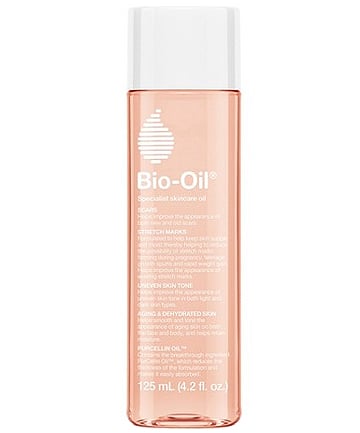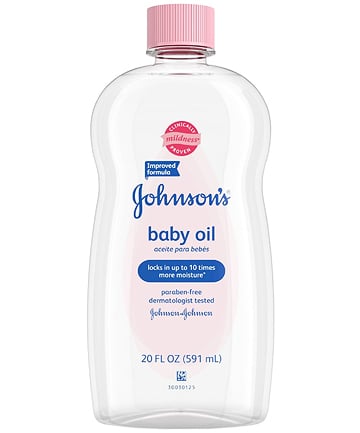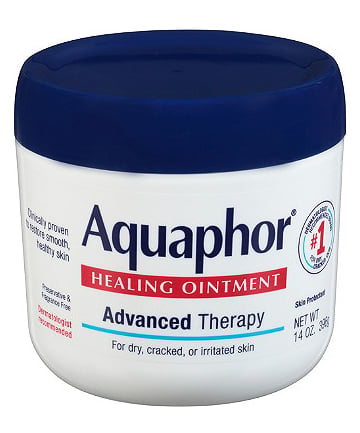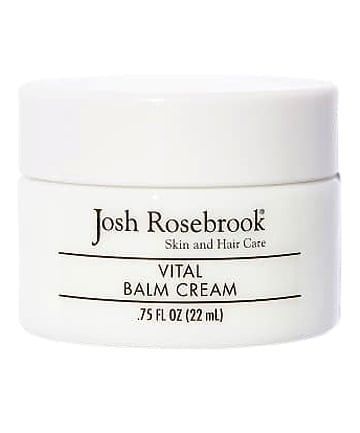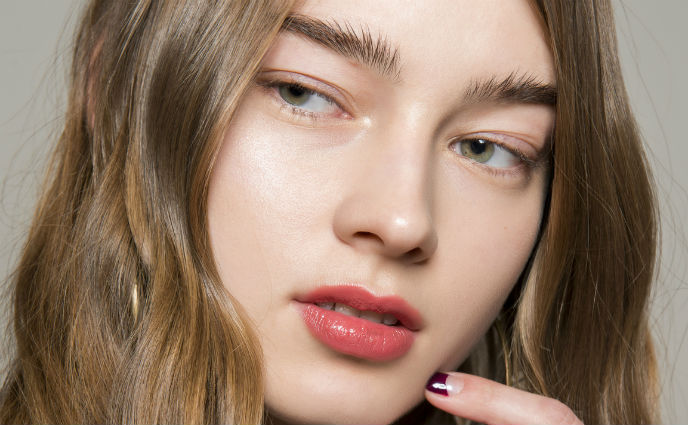Mineral oil is a very emollient and occlusive (sits on top of skin) moisturizer, says Tara Foley, founder and CEO of Follain. Its molecules are quite large, which is why it sits on the surface of the skin. The benefit of this is that it helps to trap moisture and form a barrier on the surface of the skin. These attributes allow it to function as a protectant.
Mineral oil is stable, smooth, effective and inexpensive, which is why it has been a common ingredient in beauty products for "many, many years," Grossman says. Besides conventional baby oils, it frequently appears in heavier lotions, creams, body lotions and even makeup removers. It can be found in a range of brands, from drugstore to luxury products. Aquaphor Healing Ointment, $17, Vaseline Jelly Original, $3.49, and Johnson's Baby Oil, $4.99, are some of the most well-known options.
The EWG gives mineral oil a score of one to three, depending upon its usage. It has a low risk of contributing to cancer and a moderate risk of non-reproductive organ system toxicity.
Image via Target
Mineral oil is stable, smooth, effective and inexpensive, which is why it has been a common ingredient in beauty products for "many, many years," Grossman says. Besides conventional baby oils, it frequently appears in heavier lotions, creams, body lotions and even makeup removers. It can be found in a range of brands, from drugstore to luxury products. Aquaphor Healing Ointment, $17, Vaseline Jelly Original, $3.49, and Johnson's Baby Oil, $4.99, are some of the most well-known options.
The EWG gives mineral oil a score of one to three, depending upon its usage. It has a low risk of contributing to cancer and a moderate risk of non-reproductive organ system toxicity.
Image via Target
The fact that mineral oil is a byproduct of gasoline is the big issue. It's a non-renewable resource that's bad for the environment as it adds to global pollution and the destruction of ecosystems, celebrity aesthetician Biba de Sousa says. Plus, there's controversy about whether it has contaminant left from the processing of petroleum and crude oil.
At times, some unscrupulous formulators used poor quality, impure mineral oil with potential comedogenic and carcinogenic properties, Kraffert says. Times have changed, however, and now virtually all skin care product manufacturers use only pure cosmetic grade mineral oil in their products.
Also an issue is the fact that mineral oil sits on top of skin, Foley says. While useful as a skin barrier, mineral oil doesn't moisturize skin on a long-term basis because it doesn't sink into pores, and it doesn't bring any additional hydration to the skin. It simply traps what's there, which has pore-clogging, pimple-causing potential. Grossman adds that mineral oil can aggravate acne and those who have oily skin might fight it too greasy.
Image via Target
At times, some unscrupulous formulators used poor quality, impure mineral oil with potential comedogenic and carcinogenic properties, Kraffert says. Times have changed, however, and now virtually all skin care product manufacturers use only pure cosmetic grade mineral oil in their products.
Also an issue is the fact that mineral oil sits on top of skin, Foley says. While useful as a skin barrier, mineral oil doesn't moisturize skin on a long-term basis because it doesn't sink into pores, and it doesn't bring any additional hydration to the skin. It simply traps what's there, which has pore-clogging, pimple-causing potential. Grossman adds that mineral oil can aggravate acne and those who have oily skin might fight it too greasy.
Image via Target
It really all comes down to personal choice, according to the experts. There are different factors to consider, including lifestyle choices, skin type, usage and desired results. "Mineral oil is safe, non-irritating, noncomedogenic and occlusive. It is safe to use, all over," De Sousa says. "However, it is just that: occlusive, it doesn't nourish the skin, it is just sitting on the top of the skin. This is why some prefer other oils that have additional skin benefits." Personally, she would choose not to use mineral oil.
Kraffert agrees: "While there is nothing 'wrong' or 'dangerous' with the use of pure mineral oil, there are myriad better options." Many products are formulated without mineral oil so brands can avoid its controversial reputation and be more appealing. "The dysphoria of seeing mineral oil on a cosmetic product ingredient list is common but the presence of mineral oil — in and of itself — is not grounds for real concern regarding function, safety or quality of the product in which it appears," he says. Kraffert suggests judging products that contain mineral oil as just one of their ingredients on their own merits.
Grossman finds that patients with dry skin like products with mineral oil as the products tend to be heavier. Mineral oil-based products are good options after laser procedures as they carry a low risk of irritant or allergic reaction. "We use them on a regular basis to aid in healing of the skin," she says. Additionally, frequent hand washers or those who suffer from eczema find mineral oil-rich Vaseline and Aquaphor to be great options.
Foley is among those who do not recommend using mineral oil and includes it on Follain's restricted ingredients list. Hewett is also against regular use. "I would only use pharmaceutical grade mineral oil if you have to use it and I would use it sparingly," she says. "A good reason would be a cut or abrasion that you must protect." Instead, Hewett would look for something "less suffocating" that has more nourishing properties.
Kraffert has a food analogy that can help put the ingredient into perspective: "Mineral oil is akin to iceberg lettuce. Some people stay away from iceberg lettuce out of nutritional principle. Most people, however, enjoy it in salads mixed with other ingredients. Nevertheless, few people enjoy routinely consuming iceberg lettuce 'pure' as a meal or dish. And that's the way it is, for the most part, with mineral oil."
Image via Ulta
Kraffert agrees: "While there is nothing 'wrong' or 'dangerous' with the use of pure mineral oil, there are myriad better options." Many products are formulated without mineral oil so brands can avoid its controversial reputation and be more appealing. "The dysphoria of seeing mineral oil on a cosmetic product ingredient list is common but the presence of mineral oil — in and of itself — is not grounds for real concern regarding function, safety or quality of the product in which it appears," he says. Kraffert suggests judging products that contain mineral oil as just one of their ingredients on their own merits.
Grossman finds that patients with dry skin like products with mineral oil as the products tend to be heavier. Mineral oil-based products are good options after laser procedures as they carry a low risk of irritant or allergic reaction. "We use them on a regular basis to aid in healing of the skin," she says. Additionally, frequent hand washers or those who suffer from eczema find mineral oil-rich Vaseline and Aquaphor to be great options.
Foley is among those who do not recommend using mineral oil and includes it on Follain's restricted ingredients list. Hewett is also against regular use. "I would only use pharmaceutical grade mineral oil if you have to use it and I would use it sparingly," she says. "A good reason would be a cut or abrasion that you must protect." Instead, Hewett would look for something "less suffocating" that has more nourishing properties.
Kraffert has a food analogy that can help put the ingredient into perspective: "Mineral oil is akin to iceberg lettuce. Some people stay away from iceberg lettuce out of nutritional principle. Most people, however, enjoy it in salads mixed with other ingredients. Nevertheless, few people enjoy routinely consuming iceberg lettuce 'pure' as a meal or dish. And that's the way it is, for the most part, with mineral oil."
Image via Ulta
If you aren't into the idea of using mineral oil, you'll be happy to know that there are plenty of other options. "There are many oils out there that are good occlusive agents, but also carry other skin care benefits," Grossman says. Examples include coconut oil, shea butter and olive oil.
Hewett says to specifically look for oils with larger molecules that don't penetrate the skin easily to replicate the effect of mineral oil. They include castor oil, avocado oil and grapeseed oil. Beeswax is another good alternative as it creates a barrier on skin.
Some excellent mineral oil alternatives include Josh Rosebrook Vital Balm Cream, $45, Josie Maran Whipped Argan Oil Body Butter, $35, and Lush Ultrabalm, $16.95.
Image via Follain
Hewett says to specifically look for oils with larger molecules that don't penetrate the skin easily to replicate the effect of mineral oil. They include castor oil, avocado oil and grapeseed oil. Beeswax is another good alternative as it creates a barrier on skin.
Some excellent mineral oil alternatives include Josh Rosebrook Vital Balm Cream, $45, Josie Maran Whipped Argan Oil Body Butter, $35, and Lush Ultrabalm, $16.95.
Image via Follain


